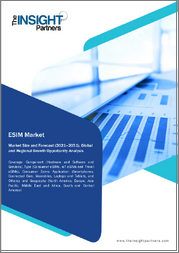
|
시장보고서
상품코드
1867374
소비자 시장 및 IoT 시장의 eSIMeSIM in the Consumer and IoT Markets |
||||||
※ 본 상품은 영문 자료로 한글과 영문 목차에 불일치하는 내용이 있을 경우 영문을 우선합니다. 정확한 검토를 위해 영문 목차를 참고해주시기 바랍니다.
실용적인 장점 :
- 임베디드 가입자 ID 모듈(eSIM) 시장의 성장을 추적하고 가장 큰 기회를 파악합니다. 임베디드 범용 IC 카드(eUICC) 및 통합형 범용 IC 카드(iUICC) 폼팩터, 소비자 및 사물인터넷(IoT) 디바이스 유형, IoT 용도(수직 시장)을 포괄하는 범위입니다.
- SGP.32의 상용화 시작 지연과 그것이 IoT 용도에 미치는 영향을 감안하여 예측을 재검토하고 정량화합니다.
- 스마트폰 OEM 벤더별 분석을 통해 소비자 시장의 지역별 복잡성을 이해합니다.
중요한 질문에 대한 답변 :
- 2024-2030년 소비자 및 IoT 시장에서 eSIM의 전체 시장 규모는?
- 중국내 보급률 증가와 소비자용 스마트폰 출시 등을 고려했을 때, 소비자 시장의 지역별 분포는 어떠하며, 향후 5년간 어떻게 변화하는가?
- 집적회로(IC) 폼팩터(독립형 대 3-in-1 eUICC, iUICC 보급률)의 상황은 어떻게 변화하는가?
- 현재 프로파일 다운로드의 규모는 어느 정도인가? 또한 향후 5년간 어떻게 발전하는가?
- 소비자 활성화율은 어떻게 변화하고, IoT 활성화는 GSMA SGP 표준에 따라 어떻게 나뉘는가?
- 주요 IC 공급업체는 어느 기업이며, 각각 시장 점유율은 어느 정도인가?
조사 주요 포인트 :
- 소비자용 디바이스 및 IoT 용도의 디바이스 및 IC 예측(지역별, 디바이스 유형별 소비자 분석 포함)
- 소비자 및 IoT 분야에서의 eSIM 보급률
- IoT 용도별 원격 SIM 프로비저닝(RSP) 지원 eSIM 출하량
- 사양별로 분류된 소비자 및 IoT용 프로파일 다운로드 예측
- 지역별, 제조업체별 eSIM 탑재 스마트폰 출하량 및 보급률
- eSIM IC 벤더의 시장 점유율
이 보고서는 다음과 같은 분들에게 읽어보시길 권해드립니다.
- 스마트카드, 보안 IC, 모듈, 디바이스 제조업체의 전략 및 제품 설계 책임자
- 주요 동향과 우선순위를 이해하고자 하는 영업 및 마케팅 책임자
- eSIM 인프라 사업자로서 총잠재시장 규모(TAM) 정량화, 주요 기회 파악, 기술 지원 기능의 우선순위를 정하고자 하는 경우
- IoT 전략 담당자 및 모듈 공급업체가 통합 요구사항과 TAM을 식별하는 IoT 전략 담당자 및 모듈 공급업체
목차
표
도표
- 도표 1 eSIM 디바이스 출하량, 애플리케이션 디바이스 유형별
- 도표 2 eSIM 개요 다운로드 수, 사양 유형별
- 도표 3 eSIM 개요 다운로드 보급률, 사양 유형별
- 도표 4 eSIM 스마트폰 출하 보급률, OEM별
- 도표 5 eSIM 스마트폰 출하대수, 지역별
- 도표 6 IoT eSIM 출하 상황, 애플리케이션별
- 도표 7 iUICC 출하 보급률 - 소비자 vs. M2MIoT
- 도표 8 eSIM IC 벤더의 시장 점유율
Actionable Benefits:
- Track growth and identify the largest opportunities in the Embedded Subscriber Identity Module (eSIM) markets-across embedded Universal Integrated Circuit Card (eUICC) and integrated Universal Integrated Circuit Card (iUICC) form factors, consumer and Internet of Things (IoT) device types, and IoT applications (verticals).
- Revise and quantify expectations following the delayed commercial launch of SGP.32 and its impact on IoT applications.
- Understand regional complexities in the consumer market with smartphone Original Equipment Manufacturer (OEM) vendor breakdowns.
Critical Questions Answered:
- What is the total market size for eSIM in the consumer and IoT markets from 2024 to 2030?
- What is the regional breakdown of the consumer market, and how will this change over the coming 5 years, given the increasing penetration and consumer smartphone launch in China?
- How will the Integrated Circuit (IC) form factor (standalone versus 3-in-1 eUICC, iUICC penetration) landscape evolve?
- What is the current scale of profile downloads, and how will this progress in the coming 5 years?
- How will consumer activation rates change, and how will IoT activations split across GSMA SGP standards?
- Who are the leading IC suppliers, and what are their respective market shares?
Research Highlights:
- Device and IC forecasts across consumer devices and IoT applications with regional consumer splits across device types.
- eSIM penetration rates across consumer and IoT.
- Remote SIM Provisioning (RSP)-capable eSIM shipments by IoT application.
- Profile download forecasts across consumer and IoT, split by specification.
- eSIM smartphone shipments and penetration rates by region and vendor.
- eSIM IC vendor market shares.
Who Should Read This?
- Strategic and product design leads within smart card, secure IC, module, and device makers.
- Sales and marketing leads seeking to understand key trends and priorities.
- eSIM infrastructure players looking to quantify Total Addressable Market (TAM) size, identify key opportunities and prioritize technology support features.
- IoT strategists and module vendors identifying integration requirements and TAM.
TABLE OF CONTENTS
Tables
- Table 1 eSIM Device Shipments - Consumer Versus M2MIoT
- Table 2 eSIM Device Shipments by Application
- Table 3 eSIM Shipments by Form Factor
- Table 4 Total eSIM IC Shipments by Application
- Table 5 eSIM Profile Downloads by Specification Type
- Table 6 SGP22 Consumer Profile Downloads by Region
- Table 7 SGP32 Profile Downloads by Application
- Table 8 SGP02 Profile Downloads by Application
- Table 9 eSIM Smartphone Shipments by OEM
- Table 10 eSIM Smartphone Shipments by Region
- Table 11 eSIM Smartphone Shipments by OEM
- Table 12 eSIM Smartphone Shipments by OEM
- Table 13 eSIM Smartphone Shipments by OEM
- Table 14 eSIM Smartphone Shipments by OEM
- Table 15 eSIM Smartphone Shipments by OEM
- Table 16 eSIM Smartphone Shipments by OEM
- Table 17 eSIM Smartphone Shipments by OEM
- Table 18 Apple eSIM Enabled Smartphone Shipments by Region
- Table 19 Google eSIM Enabled Smartphone Shipments by Region
- Table 20 HONOR eSIM Enabled Smartphone Shipments by Region
- Table 21 Huawei eSIM Enabled Smartphone Shipments by Region
- Table 22 Motorola eSIM Enabled Smartphone Shipments by Region
- Table 23 MicrosoftNokia eSIM Enabled Smartphone Shipments by Region
- Table 24 OPPO eSIM Enabled Smartphone Shipments by Region
- Table 25 Samsung eSIM Enabled Smartphone Shipments by Region
- Table 26 Sony eSIM Enabled Smartphone Shipments by Region
- Table 27 TCLAlcatel eSIM Enabled Smartphone Shipments by Region
- Table 28 vivo eSIM Enabled Smartphone Shipments by Region
- Table 29 Xiaomi eSIM Enabled Smartphone Shipments by Region
- Table 30 Other eSIM Enabled Smartphone Shipments by Region
- Table 31 Total eSIM Enabled Smartphone Shipment Penetration Rate
- Table 32 Apple eSIM Enabled Smartphone Shipment Penetration Rate
- Table 33 Google eSIM Enabled Smartphone Shipment Penetration Rate
- Table 34 HONOR eSIM Enabled Smartphone Shipment Penetration Rate
- Table 35 Huawei eSIM Enabled Smartphone Shipment Penetration Rate
- Table 36 Motorola eSIM Enabled Smartphone Shipment Penetration Rate
- Table 37 MicrosoftNokia eSIM Enabled Smartphone Shipment Penetration Rate
- Table 38 OPPO eSIM Enabled Smartphone Shipment Penetration Rate
- Table 39 Samsung eSIM Enabled Smartphone Shipment Penetration Rate
- Table 40 Sony eSIM Enabled Smartphone Shipment Penetration Rate
- Table 41 TCLAlcatel eSIM Enabled Smartphone Shipment Penetration Rate
- Table 42 vivo eSIM Enabled Smartphone Shipment Penetration Rate
- Table 43 Xiaomi eSIM Enabled Smartphone Shipment Penetration Rate
- Table 44 Other eSIM Enabled Smartphone Shipment Penetration Rate
- Table 45 eSIM Non Smartphone Device Shipments by Type
- Table 46 eSIM Wearable Device Shipments by Region
- Table 47 eSIM Wearable Device Shipments by Type
- Table 48 eSIM Wearable Device Shipments by Type
- Table 49 eSIM Wearable Device Shipments by Type
- Table 50 eSIM Wearable Device Shipments by Type
- Table 51 eSIM Wearable Device Shipments by Type
- Table 52 eSIM Wearable Device Shipments by Type
- Table 53 eSIM Wearable Device Shipments by Type
- Table 54 eSIM Tablet Device Shipments by Region
- Table 55 eSIM Laptop Device Shipments by Region
- Table 56 eSIM Other Consumer Device Shipments by Region
- Table 57 Wearable eSIM Enabled Device Shipment Penetration Rate
- Table 58 Tablet eSIM Enabled Device Shipment Penetration Rate
- Table 59 Laptop eSIM Enabled Device Shipment Penetration Rate
- Table 60 IoT eSIM Shipments by Application
- Table 61 IoT RSP Capable eSIM Shipments by Application
- Table 62 IoT RSP Capable eSIM Shipments Penetration Rate by Application
- Table 63 iUICC Shipments - Consumer Versus M2MIoT
- Table 64 iUICC Shipments by Device TypeEnd Market
- Table 65 eSIM IC Vendor Market Shares
Charts
- Chart 1 eSIM Device Shipments by ApplicationDevice Type
- Chart 2 eSIM Profile Downloads by Specification Type
- Chart 3 eSIM Profile Download Penetration Rates by Specification Type
- Chart 4 eSIM Smartphone Shipment Penetration Rate by OEM
- Chart 5 eSIM Smartphone Shipments by Region
- Chart 6 IoT eSIM Shipments by Application
- Chart 7 iUICC Shipment Penetration Rates - Consumer Versus M2MIoT
- Chart 8 eSIM IC Vendor Market Shares
샘플 요청 목록


















